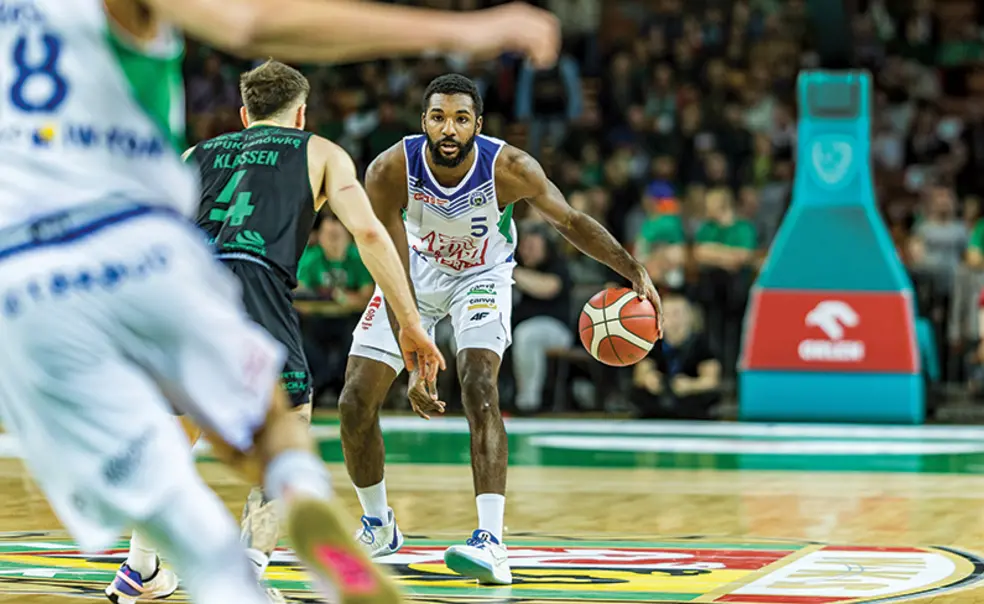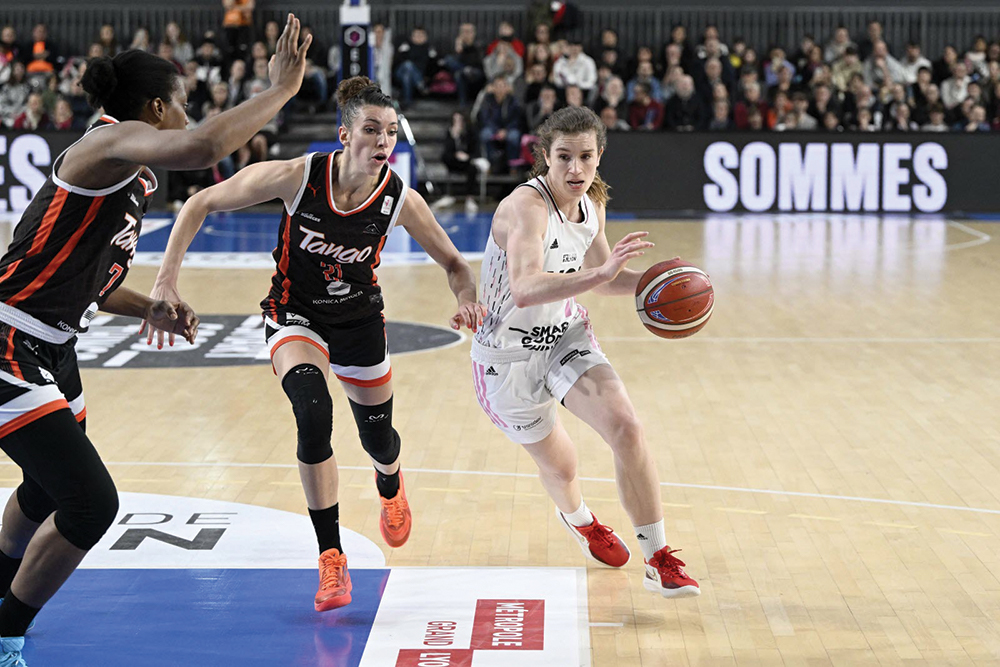Former Princeton Basketball Stars Stretch Their Wings Overseas
As overseas pros, these former Princeton players are embracing new experiences
Opening tip was more than one hour away as Amir Bell ’18 stretched his legs in individual drills courtside before a game late last season in the top men’s pro basketball league in Poland.
About 15 minutes later, he joined his teammates in a different set of exercises aimed to loosen the leg muscles — as a muscular, stern strength and conditioning coach for his club, Anwil, watched intently a few feet away. Perhaps routine to the untrained eye, this pregame ritual took on added meaning for Bell as he battled back after a horrific injury while playing in Germany in March 2023.
“I was playing in Bamberg last year and I broke my leg. I was able to get back for the start of the season, but there were ups and downs,” recalled the 6-foot-4 Bell, a native of East Brunswick, New Jersey, who spent the 2023-24 season in Wloclawek, a city of about 100,000 in southeast Poland. “It has been working with the strength coach and the training staff, just making sure you have a daily routine. The doctors and my training staff were confident after the surgery. They pushed me hard to come back after the surgery.”
Getting injured thousands of miles from home is one of the challenges Bell has faced in six seasons of overseas hoops. He had played in Italy, Malaysia, Israel, and Germany before joining Anwil in Poland.
Experiencing different cultures is part of the job, Bell said, as he realized during his first season, in Italy. “You play a game in Bologna and the fans are going crazy an hour and a half before the game,” he said. “The hardest adjustment off the court was probably being away from friends and family. The season is 10 months, so you’re basically living abroad your whole life. You have your summer at home. On the court, when you first get overseas, you realize the game is called a little different.”
Bell keeps in touch with former Princeton teammates who’ve also played overseas, including Myles Stephens ’19
(Czechia, formerly called the Czech Republic), Spencer Weisz ’17 (Israel), and Ryan Schwieger ’21 and Richmond Aririguzoh ’20, who played for the same team in Germany last season. Stephens has also played for pay in Belgium, Finland, Germany, and Italy, while Aririguzoh has competed with clubs in Belgium and Denmark.
After starting the season in Italy, Stephens helped lead ERA Nymburk to the title in the top Czech league as he averaged 12.3 points in league games. “It has been a long and mentally tough year for me playing first in Italy and then transitioning to Czechia,” he said. “Here in Nymburk it has been great though. And you cannot beat being only a 30-minute drive from Prague.” He had 16 points in the championship series finale as Nymburk beat Ústí nad Labem May 30.
Other former Tigers overseas in 2023-24 included Ethan Wright ’22 (Romania) and Ian Hummer ’13 (Japan). Hummer has also played in Finland, France, Germany, Greece, Russia, and Turkey.
Wright’s mother, Ellen DeVoe ’86, was a standout for the Tigers, while Aririguzoh was born in Italy and moved to the U.S. at age 12, then was a star at Trenton Catholic.
On the women’s side, former Tiger stars who have played overseas recently include Grace Stone ’23 in Australia, Blake Dietrick ’15 in France, and Carlie Littlefield ’21 in Slovakia. Stone, from New York, is a rookie who also played in Cyprus. Dietrick, a native of suburban Boston, is a seasoned veteran who has also played in the WNBA for San Antonio, Atlanta, and Seattle. Her overseas experiences include stints in Australia, Spain, Greece, and Italy. Littlefield ended her college career at North Carolina after three years as a starter for the Tigers in 2017-20.
Not everyone can adapt to life overseas.
“You just must become more mature and independent,” Dietrick told PAW in an email. “You don’t have a cohesive team in the same way because of the language barrier, and older players who have families, etc. You need to learn to figure things out on your own, both on and off the court. But that independence forces you to grow and adapt quickly if you want to be successful.”
There are fun challenges, too, like finding a go-to coffee shop or figuring out the best way to spend your free time. “My favorite city to live in was Athens, Greece,” Dietrick said. “I would hop on a ferry and go to an island on off days, or explore the city center. Athens has so much history, and the Greek people are so welcoming and happy to help you. The food is also fabulous and fresh and local. It was such a wonderful experience.”
Littlefield had to make several transitions when her pro career began in Belgium. She recently played in Košice, Slovakia.
“The biggest adjustment off the court when playing overseas is figuring out how to fill your free time when not playing basketball,” the Iowa native told PAW via email. “Many of my teammates that I have played with overseas have jobs or are still in school. This has presented an opportunity for me to spend my free time exploring new cities, finding new hobbies (building puzzles), trying to learn a new language, and really getting comfortable with being alone in a new environment, which is not always easy.”
Many top-flight American women, including Dietrick, are forced to play overseas after the WNBA season since
the pay in the women’s pro circuit is far less than their male counterparts earn in the NBA.
Most American men with a Division I pedigree are provided the free use of an apartment and car, and sometimes a meal allowance, by their club in Europe, which minimizes expenses.
Bell, the Ivy League Defensive Player of the Year in 2017-18, said having been groomed in the Princeton offense is an asset in Europe. “We share the ball a lot [in Poland], a lot of two-man action, three-man action. That really helps us Princeton guys transition overseas.”
Many American men opt to play in the U.S.-based G League, which gives them a better chance of a call-up to the NBA, as has happened in recent years for Devin Cannady ’20 and Tosan Evbuomwan ’23. Europe, however, offers better pay than the G League.
“I really wanted to go overseas from the start after talking to older guys at Princeton,” said Bell, who majored in politics. “From that first summer after college, that was my main goal. I look at it as a job and how I can make a living, especially year six, I have been out here a while. It is my job, it’s my 9 to 5.”
David Driver, the author of Hoop Dreams in Europe: American Basketball Players Building Careers Overseas, lives in Poland with his wife.













No responses yet